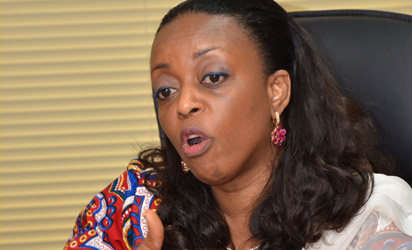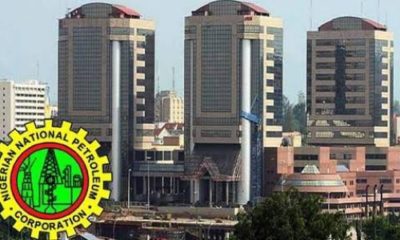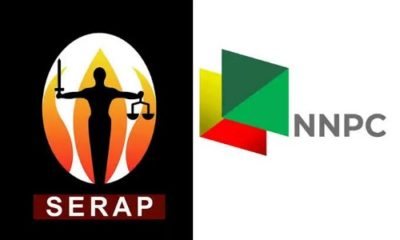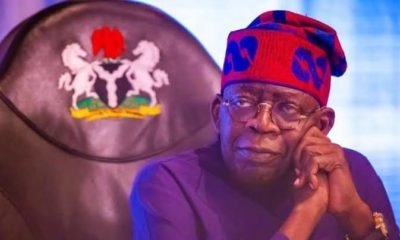Oil
Diezani Opens up: How we tackled oil industry cabals

LONDON, UK–Outgoing Minister of Petroleum Resources, Mrs. Diezani Alison-Madueke, in this interview with Arit Essanga, a freelance journalist with the African Free Press, in London, explains the intricacies and how she tackled the cabals in Nigeria’s oil industry.
Excerpts.
Thank you for granting me a few minutes of your time for this pressing discussion about the future of policy evolution in Nigeria. But I want to quickly talk about the fuel scarcity that has come just weeks before the hand-over to the new administration. The time of my appointment as Minister of Petroleum Resources 5 years ago was a time when the nation was in the throes of many years of continuous fuel scarcity and the abandonment of our fuel facilities. This was having such an adverse impact on the masses, especially in terms of livelihood and quality of life.
This situation certainly affected me and my household. I was one of those who went out to queue at filling stations and what left an indelible mark on me was the plight of the many, many women who were queuing for this essential commodity for their families! We are looking at time when women where losing their lives as a result of adulterated products as kerosene stoves were exploding all over the country! So the problem was not just about getting access to the product but also purchasing the right quality products to ensure the safety of their households of my fellow women.
It was a time when cars were ‘knocking’, generators that cost hundreds of thousands of naira were also breaking down because of adulterated products. People around the country were losing many millions of Naira as a result of loss of business incomes and we are talking of taxi drivers, face-me-I-face-you traders in the market, the lorry drivers transporting food to the markets, the okada drivers – basically the engine room of the economy was affected. I am a mother and grandmother myself and I understand the pressure that women go through in order to put food on the table for their families. I am very sensitive to the struggles of the Nigerian woman. So, when granted the opportunity to serve the country as Petroleum Resources minister, I made this my first priority. Dealing with the fuel scarcity was a key issue that I resolved to address as soon as I stepped into office.
Nigeria is a country that relies on access to petroleum products for businesses to thrive, for families to survive and for communities to evolve. For me it was a fundamental issue. I Diezani Alison-Madueke immediately set to the task. Several inter-ministerial committees were formed to get to the root of the matter including liaising with marketers and the unions. A few things were identified such as the process of payment to marketers as well as the improvement of the distribution & monitoring mechanisms. The Ministry of Finance is charged with addressing the payment process while the Ministry of Petroleum Resources and its parastatals tackle production, distribution and monitoring aspects.
What did you do in terms of tackling the issue of access to products? Firstly sectorial reforms were put in place, and an attempt was made to establish a uniform pricing regime across the country, which still requires task forces to be put in place to oversee its success. Secondly, an aggressive strategy was completed to build as well as refurbish over 23 Nigerian National Petroleum Corporation (NNPC) depots across the country many of which, had lain fallow for several years. This is the result of the determined efforts of the Pipelines and Product Marketing Company (PPMC), a subsidiary of the NNPC. The aggressive establishment of the depots occurred from Aba to Benin, from Gusau to Suleja, in an attempt to ensure a more robust delivery of products, to not only those areas but also all contingent areas.
Thirdly many vandalized pipelines have been restored and expanded in addition, fuel products are now transported by rail where possible to ensure that the products get to the depots in good time to avert situations of shortage. Furthermore, NNPC now holds and maintains a 30-day stock of PMS, as part of the National Strategic Stock Reserve for products. The Ministry has also increased the flash point for DPK (kerosene) from 44 to 45 (curbing the incidences of kerosene cookers exploding) – I cannot remember the last time a kerosene cooker has exploded; implemented inspection of trucks at each NNPC Depot for cleanness (preventing contamination) and lab testing of truck samples for quality control.
DPR also introduced colour coding for all trucks loading any petroleum product, this means the trucks cannot be used for any other purpose apart from what it has been coded to load. Many Nigerians will attest to the fact that before now, the country has been “wet” with products with even filling stations in remote areas, able to dispense products. I also led the roll out of robust measures to identify and penalise those behind the activities of fuel adulteration as well as pipeline vandalism, in a joint effort between security agencies, the NNPC and the Department of Petroleum Resources (DPR). The first joint meeting between the key parastatals, the Service Chiefs and Inspector General of Police took place at the Oriental Hotel. It was the first meeting of its kind in the history of the sector.
If all these measures have been put in place why has there been this crippling fuel crisis?
The fuel scarcity that we see today I can only describe as the ‘fear of the unknown’ in these last few days before hand-over. It is also a backlog following the attempts by the government to stamp-out the subsidy fraud and clean the system in November 2011. Identifying and cutting out up to 92 marketers who had been round-tripping reduced the subsidy payments by about 50%. This also brought about a few delays in payment, as the investigations to identify erring marketers were robust and took time.
 We are faced with a situation where the marketers want this administration to pay them all the money they are owed before the tenure runs out on May 29. This is a difficult situation more peculiarly because this administration did not incur all the debt, which actually goes back 40 years. It is a rolling obligation. There has never been a time, when the debt obligations was reduced to zero it is cyclical. What the marketers are asking for is not just the outstanding amount to be paid but also for the exchange rate differential that they have incurred. This is in the light of the many conversations that are on going about deregulating the subsidy payments. The transition period is allowing the marketers to try to forestall any losses as a result of a change in regime, while this makes good business sense it is the polity that suffer. The Ministry of Finance and the presidency are giving this situation the priority it deserves.
We are faced with a situation where the marketers want this administration to pay them all the money they are owed before the tenure runs out on May 29. This is a difficult situation more peculiarly because this administration did not incur all the debt, which actually goes back 40 years. It is a rolling obligation. There has never been a time, when the debt obligations was reduced to zero it is cyclical. What the marketers are asking for is not just the outstanding amount to be paid but also for the exchange rate differential that they have incurred. This is in the light of the many conversations that are on going about deregulating the subsidy payments. The transition period is allowing the marketers to try to forestall any losses as a result of a change in regime, while this makes good business sense it is the polity that suffer. The Ministry of Finance and the presidency are giving this situation the priority it deserves.
Let’s talk about some of the allegations that you face with regards to ensuring stability of supply across the country, more specifically about the debate on the subsidy. The memory of Occupy Nigeria is still distant but we see this same situation by marketers holding the country to ransom?
Let me start by making the distinction that the decision as to whether subsidy payments are made or not is entirely economic and outside my purview as Ministry of Petroleum Resources. What we are responsible for is the production, distribution and marketing aspects. What we also do is give a view as to the status in terms of these 3 areas and the decision becomes an economic one from the Presidency. In terms of my direct actions in November 2011, following the high incidence of subsidy claims, with a stroke of the pen, I removed 92 throughput marketers from the PPPRA scheme because we believed that within the group were the round trippers who were causing problems for the country in term of the burgeoning levels of subsidy payments. As a consequence of this action, the amount of subsidy payments dropped by over 50%.
A series of probes where kicked-off to investigate the transactions of these marketers and to begin to bring in a level of accountability and transparency into the system of subsidy payments. The lists of these marketers were also published in the local press and a series of probes ensued. The marketers had to justify their claims to the payments. This was the first ever-major cleanup of the subsidy programmes and yet again the ministry was vindicated and offending marketers are going through the legal implications of their actions.
The Petroleum Products Pricing Regulatory Agency (PPPRA) was also restructured and the processes in place for the determination of subsidy payments were comprehensively reviewed. But these actions led to major push back by many with accusations of corruption against the ministry and NNPC to get us to back down. I am sure I stepped on the toes of the greedy cabals that have dominated the sector for years, upset at the change in the system. The push back has come from many other sources beyond the marketers and the funny thing is these are the same people that shout corruption the loudest but yet are unable to accept the reforms that are being put in place to make the sector more accountable so we are almost caught between a rock and hard place in the sector. [The minister at this point puts her hands on her head and sighs] In fact this is where the bane of my problems as a woman in government began. I wonder why people seem to want to put a tag of corruption against my name when all I have ever tried to do is to open the sector up for more Nigerians and make it work better for the benefit of the country. If I were corrupt would we have achieved the extent of reform that has occurred in the sector to date? Ah my brother, I have worked tirelessly to curtail the excesses while ensuring that the country remains wet with products and the sector run more efficiently.
I have constantly ignored the viciousness and focused on my job. The most important point to make in terms of stability of supply is that today, marketers have a clear contract to deliver their products on specified dates. Marketers are put under strict terms to deliver products at dates specified if they miss the cutoff date for delivery then their cargo goes into demurrage which in itself acts as an incentive to ensure supplies. More recently, as part of the transition activity I have instructed that all of the swap operators across the board provide detailed and clear reports about their export and import activities so that a reconciliation can be conducted and published for all Nigerians to see.
These swap transactions involve extremely high volumes and huge cost obligations to banks. The contracts with these operators are very stringent indeed and delivery specifications clear. There are serious ramifications to the operators for non-delivery most especially by the banks for non-delivery this is dependent generally on the lines of credit arrangements. This is being done as part of my commitment to accountability and transparency to Nigerians. It will also put to bed the various claims in the press about different alleged practices by the operators that are being associated to me. The operators deal with the NNPC according to tight contractual agreements.
All the swap operators were well vetted and passed as credible Nigerian corporations capable of executing such major stringent contracts with no room for any offences to the system. So when you have strict contracts in place and bank obligations it is surprising that mischief-makers can say that I am in league with some of these operators in acts of corruption! It shows that they have no idea how the system works and I would ask that they educate themselves before they speak. If Aiteo, Talevaras or any other operator were cheating the NNPC it would be made public as the system has been reorganized to do this automatically. The publication of the reconciled transactions from the time the contracts were assigned to them will also be a testament to this commitment. Erring contractors will be made to face the legal implications of any wrongdoings that are uncovered.
Oil
NNPC Discovers Over 4,800 Illegal Pipeline Connections

The Nigerian National Petroleum Company (NNPC) Limited has revealed the detection of more than 4,800 unauthorized connections on oil pipelines within the country, painting a troubling image of the nation’s primary source of revenue.
Mele Kyari, the Group Chief Executive Officer of NNPC Ltd, communicated this information to the Senate Committee on Appropriations last Friday.
He said, “We have over 4,800 illegal connections on our pipelines. That means in some lines, within 100 kilometres of pipelines, you have as much as 300 insertions.
“Therefore, even when you produce the oil, you cannot deliver them at the required pressure and therefore the volume will also be less.”
As per the NNPC Ltd chief, individuals from various regions enter the Niger Delta, inserting unauthorized connections on pipelines in Nigeria’s oil-producing area.
This recent revelation follows a prior discovery of 295 illegal connections to the pipelines by the firm a year ago, underscoring the escalating issue of crude oil theft in Nigeria.
Two years earlier, Kyari had highlighted the country’s daily loss of 200,000 barrels of oil, amounting to $13 million due to theft and vandalism.
He further stated “We have two sets of losses, one coming from our products and the other coming from crude oil. In terms of crude losses, it is still going on. On the average, we are losing 200,000 barrels of crude every day.”
After the discovery, Nigeria’s security forces pledged to enhance security around the country’s pipelines.
To bolster this, the Federal Government granted a multi-billion naira pipelines surveillance contract to Tantita Security Services, headed by former militant leader Government Ekpemepulo, also known as Tompolo.
Despite facing criticism for this decision, Senator Heineken Lokpobiri, the Minister of State for Petroleum, remains convinced that it was the appropriate course of action.
In August, following a tour of oil facilities in the Niger Delta, Senator Heineken Lokpobiri expressed gratitude to Tantita, commissioned by NNPC Ltd, for their ongoing work.
He also hinted at plans for further extensive endeavors in the future.
In 2021, after extensive debate and delays, the Petroleum Industry Bill was finally passed to attract increased foreign investment into the oil sector through amendments to regulations, royalties, and taxes.
Oil
Dangote Refinery Set To Begin Fuel Production With First Crude Arrival

Nigeria’s colossal $19 billion Dangote Refinery, after encountering several setbacks, is on the verge of kickstarting fuel production.
This achievement is heralded by the arrival of the first crude shipment, transported by the OTIS tanker carrying 950,000 barrels of Nigeria’s Agbami crude.
S&P Global, citing industry sources and tanker tracking data on spglobal.com, reported the tanker’s departure on December 6, en route to Lekki, the nearest land port to Dangote’s offshore crude receiving terminal.
Scheduled to reach its destination around 8 PM on December 7, the arrival of this shipment signifies the commencement of crude supplies for the refinery’s operations.
Chartered by the state-owned Nigerian National Petroleum Company (NNPC), the Suezmax tanker is an emblem of the initial crude supply to Dangote’s cutting-edge refinery, as disclosed by a West African oil trader familiar with the matter in the S&P report.
Even though the refinery was officially completed in May, the absence of domestic crude feedstock had hindered oil product manufacturing.
To address this, the NNPC, holding a 20% stake in the refinery, struck an agreement to provide 6 million barrels of crude oil as feedstock to the Dangote refinery in December.
This move aims to jumpstart operations and overcome the previous impediments.
Agbami, operated by Chevron, holds a prominent position among Nigeria’s major deepwater developments, producing around 100,000 barrels per day in the central Niger Delta.
Known for its light sweet crude qualities, with a specific gravity of 47.9 API and a low sulfur content of 0.04%, Agbami produces substantial amounts of naphtha and kerosene.
NNPC has chartered additional shipments from different Nigerian offshore fields to the refinery, marking the start of a sequence of planned crude supplies for the month, as mentioned by the oil trader.
Located on the outskirts of Lagos, Nigeria’s commercial hub, the Dangote Refinery encountered repeated delays since its 2013 announcement, despite significant installation progress in 2019.
The refinery, designed to handle multiple crudes simultaneously, targets three Nigerian crude grades—Escravos, Bonny Light, and Forcados. When operating at full capacity, it aims to produce 327,000 barrels per day (b/d) of gasoline, 244,000 b/d of gasoil/diesel, 56,000 b/d of jet fuel/kerosene, and 290,000 metric tons per year of propane/LPG.
Dangote’s operations starting signify Nigeria’s hopes to lessen its reliance on gasoline imports, addressing the deficiencies of its existing refineries undergoing repairs. This shift is poised to reshape Nigeria’s oil industry, potentially leading to gasoline self-sufficiency by the 2040s.
Dangote officials anticipate an initial output of 370,000 barrels per day (b/d), emphasizing jet fuel and diesel production.
Industry analysts, however, project the refinery to reach its full operational capacity by mid-2025, although potential delays remain a looming concern.
Oil
NNPCL Sets Dec 2024 Terminal Date For Fuel Importation

The Nigerian National Petroleum Company Limited (NNPCL) has announced intentions to cease importing refined petroleum products by December 2024, anticipating full operational functionality for all national refineries by that time.
Group CEO, NNPC Ltd, Mele Kyari, shared this at a meeting with Speaker Tajudeen Abbas of the House of Representatives, who advocated for the privatisation of Nigeria’s refineries on Thursday.
Projections indicated the national oil firm’s revenue could climb to N4.5 trillion by the conclusion of 2023. Moreover, the rehabilitation of the Port Harcourt Refining Company, managed by NNPCL, was slated for completion by December of the current year.
Meanwhile, Oil marketers verified on Thursday that the Port Harcourt refinery is set for operations, potentially starting in January 2024. They emphasized that once operational, this refinery could notably reduce the prices of refined petroleum products.
During the meeting in Abuja, Kyari asserted Nigeria’s intention to cease importing refined petroleum products by 2024, envisioning the country’s emergence as a net exporter of these commodities within the same year.
He outlined the plans for launching operations at the Port Harcourt, Warri, and Kaduna refineries.
Kyari reiterated that all refineries would operate at full capacity, ultimately paving the way for Nigeria to transition into a net exporter of petroleum products by the conclusion of 2024.
He attributed the inactivity of Nigeria’s refineries over the years to the petroleum subsidy, emphasizing that the removal of this subsidy was drawing significant private-sector investments into the sector.
Kyari said “I can confirm to you that by the end of December this year, we will start the Port Harcourt refinery; early in the first quarter of 2024, we will start the Warri refinery and by the end of 2024, Kaduna refinery will come into operation.
“This is the commitment we are giving today and you can hold us accountable for this. In 2024, many of the initiatives including the rehabilitation of our refineries and also the efforts of small-scale refineries, and the upcoming Dangote refinery, will make Nigeria a net exporter of petroleum products in 2024.
“We will no longer be talking about fuel importation by the end of 2024. I am very optimistic that this will crystallise.
Kyari promised that by the conclusion of 2023, the government’s anticipated revenue from the company would reach N4.5 trillion, emphasizing NNPCL’s adherence to the Petroleum Industry Act and its commitment to delivering value to shareholders.
Recall that in October 2023, it was reported that Nigeria’s monthly spending on the importation of Premium Motor Spirit, known as petrol, had reached approximately N843 billion due to NNPCL’s cessation of oil swaps.
In July of this year, the Nigerian Midstream and Downstream Petroleum Regulatory Authority reported that during the post-deregulation period, spanning June 1 to June 28, 2023, the country’s total petrol consumption amounted to 1.36 billion litres, with an average daily consumption of 48.43 million litres.
The average ex-depot price of petrol, sourced solely from NNPCL as the importer, stands at about N580 per litre.
However, both NNPCL and oil marketers declared on Thursday that this substantial oil import expenditure would soon diminish.
They anticipated a drop once the Port Harcourt refinery commences production of refined petroleum products from January 2024, barring any unforeseen circumstances.



















